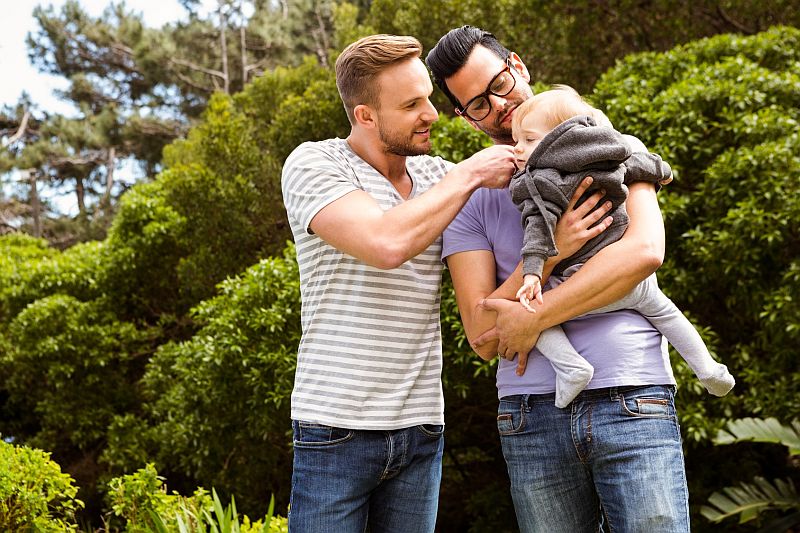Gay Dads and Their Kids Still Face Social Shaming
By Alan MozesHealthDay Reporter

MONDAY, Jan. 14, 2019 (HealthDay News) -- Two-thirds of gay fathers have felt the pain of social stigma, and they have encountered that stigma most often in religious settings, a new survey shows.
"We were not surprised that stigma is still experienced by gay fathers," said study author Dr. Ellen Perrin. "But we did not expect so much stigma to be experienced in religious settings."
In an anonymous survey of 732 American gay fathers spread across 47 states, researchers found that 63.5 percent said they had been shamed, hurt, excluded or made to feel uncomfortable in the prior year. Nearly one in five said their children had at times shied away from socializing out of anxiety that they would also encounter social stigma.
The survey also found that more than one-third of gay dads came up against social stigma at religious gatherings, making it the most common place where they were made to feel uncomfortable or shunned as parents.
Perrin, a professor of developmental-behavioral pediatrics with the Floating Hospital for Children and Tufts University's School of Medicine in Boston, stressed the findings were solely a snapshot of how stigma plays out among today's gay fathers.
Nor would she venture a guess as to whether the degree of stigma being experienced by gay fathers today is also felt by lesbian parents.
"In general, some people think that there is more stigma about gay men as fathers than lesbian women as mothers," Perrin acknowledged. "But this is not a part of our study."
Still, Perrin pointed out that stigma risk held steady across all kinds of social boundaries. "We did not find any differences in terms of rural or urban settings, racial composition of the family, or socioeconomic status of the family," she said.
Gay fathers did, however, report that they were less likely to experience such parent-related stigma if they resided in states where more same-sex legal protections were in place.
The study participants were gay men heading households that in sum cared for more than 1,300 children (average age of 13).
Nearly 40 percent of the children were born out of a heterosexual relationship, while a little over one-third became family members through adoption or foster care. Surrogacy was the birth method for about 14 percent of the kids.
Beyond religious settings, about one-quarter of the dads said stigma emanated from members of their family, neighbors or even their gay friends. An equal number reported being discriminated against by people they didn't know, such as waiters, service providers and sales clerks.
The researchers concluded that "despite encouraging legal and social changes, gay men and their children still face stigma and discrimination."
Looking ahead, Perrin suggested that reducing the risk for such stigma would most likely require making greater efforts to counteract discrimination through education and more "opportunities for interaction" between heterosexuals and gay couples.
Perrin and her colleagues reported their findings online Jan. 14 in the journal Pediatrics.
Abbie Goldberg is director of the women's and gender studies program at Clark University in Worcester, Mass. She pointed out that the concept of gay fatherhood is still "new" for some people.
"Many people, particularly older adults, grew up at a time when gay fatherhood was not visible or even seen as a possibility," Goldberg said. "Gay dads still face the stigma that men are inadequate parents when compared to mothers, who are seen as more 'innately' nurturing, and so on," she added.
"Plus, despite it being fallacious, the old stereotype of gay men as pedophiles still creeps into some people's consciousness when they are evaluating the viability and desirability of gay fathers," Goldberg noted.
Still, she said it should be recognized that in all likelihood some gay dads -- particularly those who are wealthy and/or white -- do have an easier go of it than others. Why? Because they have greater ability to sidestep stigma risk by moving to more progressive communities, and/or by sending their children to more progressive schools.
"Privilege often means choice," Goldberg said. "And white gay dads with money are more mobile. They have more options."
More information
There's more on gay parenting at Prideangel.

The news stories provided in Health News and our Health-E News Newsletter are a service of the nationally syndicated HealthDay® news and information company. Stories refer to national trends and breaking health news, and are not necessarily indicative of or always supported by our facility and providers. This information is provided for informational and educational purposes only, and is not intended to be a substitute for medical advice, diagnosis, or treatment.

